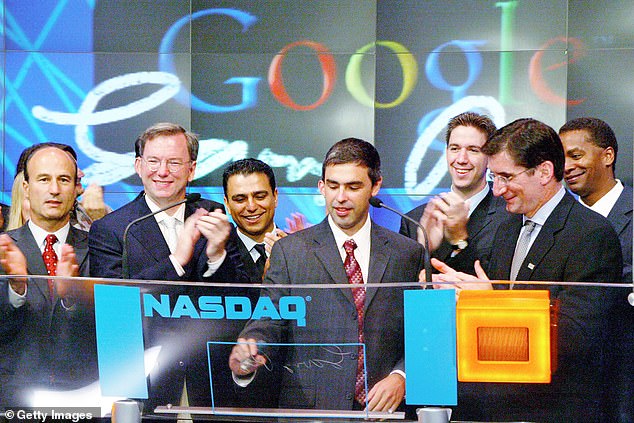ALEX BRUMMER: Hut Group, Snowflake, Klarna… It’s tricky to separate hype from reality among big technology IPOs
Spotting the winners among tech initial public offerings is a lottery. I was on assignment in the US in 2004 when Google floated and wrongly decided it couldn’t succeed because it would be strangled by film makers, publishers and the recording industry besieging it with copyright lawsuits.
The search engine was such a powerful tool that the shares of renamed parent Alphabet have shot up since then.
There is reason to carefully scrutinise digital firms coming to market in a tech bubble.

Launch: Google and Nasdaq executives including Google co-Founder Larry Page, (centre), at Google’s Nasdaq stock listing in New York City in 2004
The terrific reception for the float of Manchester-based online fitness and beauty outfit The Hut Group obviously is welcome for a London Stock Exchange seeking to lead Europe as a centre for tech trading.
The wisdom in allowing a company to be so dominated by founder, gorgeous Matt Moulding, gives serious pause.
The best thing going for The Hut is the support of former Tesco boss Sir Terry Leahy (his current stake is worth £88million), who also helped bring discount chain B&M to market.
Whether one believes in the muscle-building qualities of Myprotein or not, the real value in The Hut is likely to be in its proprietary technology, which could possibly make it the Ocado of the body beautiful.
More in the tradition of California spin-outs is Snowflake, which raised £2.5billion in New York this week, valuing the enterprise at £23billion. Snowflake operates in the cloud data sector.
The cloud has been a huge driver of value for both Amazon and Salesforce. Snowflake also has the backing of Silicon Valley venture capital pioneer Sequoia, headed by Brit Michael Moritz who helped bring Google, Oracle and Nvidia to public markets.
As fascinating, is the march of Swedish fintech creation Klarna. A new fundraising led by Silver Lake Partners led to its valuation surging to just over £8billion, making it among the most valuable fintech firms in Europe now that Germany’s Wirecard has imploded.
Klarna has revolutionised online purchases on fashion sites such as H&M through interest rate-free ‘buy now, pay later’ model, a fintech version of what used to be called the never, never.
Consumers are invoiced electronically, paying by instalment. It seeks to become a payment system of choice as Covid-19 has led to a shift to online shopping. Klarna claims 9.5m customers in the UK, 85m worldwide and 12m app users, and has 200,000 retailers signed up.
Money is made from a charge levied on retailers for each transaction. It was able to raise new cash in spite of a big increase in losses in the first half of this year to £46million as a result of Covid.
Buying fast fashion in instalments online, when unemployment is rising across the globe, might not be the most secure model.
But established banks have been so occupied updating and cyber-proofing previous-era IT that they have left space for newcomers such as Monzo and Klarna.
Tech fund raisings make it tricky to separate hype from reality.
Nuclear option
As encouraging as foreign investment in UK infrastructure may be, it leaves Britain vulnerable to decisions taken overseas.
Japan’s Hitachi is the latest prospective investor in next-generation British nuclear to give up the ghost.
Hitachi took over the power project at Wylfa in Wales when two German utilities – RWE and E.On – decided the costings made no sense after Angela Merkel suspended all nuclear projects following the Fukushima disaster in 2011.
Japan is blaming the Covid-19 investment climate even though the OECD says the UK will be the fastest-growing G7 economy in 2021, expanding by 7.6 per cent.
If China is taken off the list of potential investors at Sizewell and elsewhere, because of anger over the crackdown in Hong Kong, the Government will fast run out of overseas options.
It could potentially kill two birds with one stone if ministers decided to get fully behind Rolls-Royce’s small modular reactor (SMR) programme based upon the engineering group’s nuclear turbine expertise from submarines.
A regional network of SMRs could ensure that the UK has the base energy supply it needs and provide an important lifeline to Rolls as aerospace orders sag because of the epidemic.
The R&D and technology are alive and well. The Government should assist Rolls in scaling up if necessary, with loan guarantees and equity, and reclaim control of the UK’s nuclear destiny.
